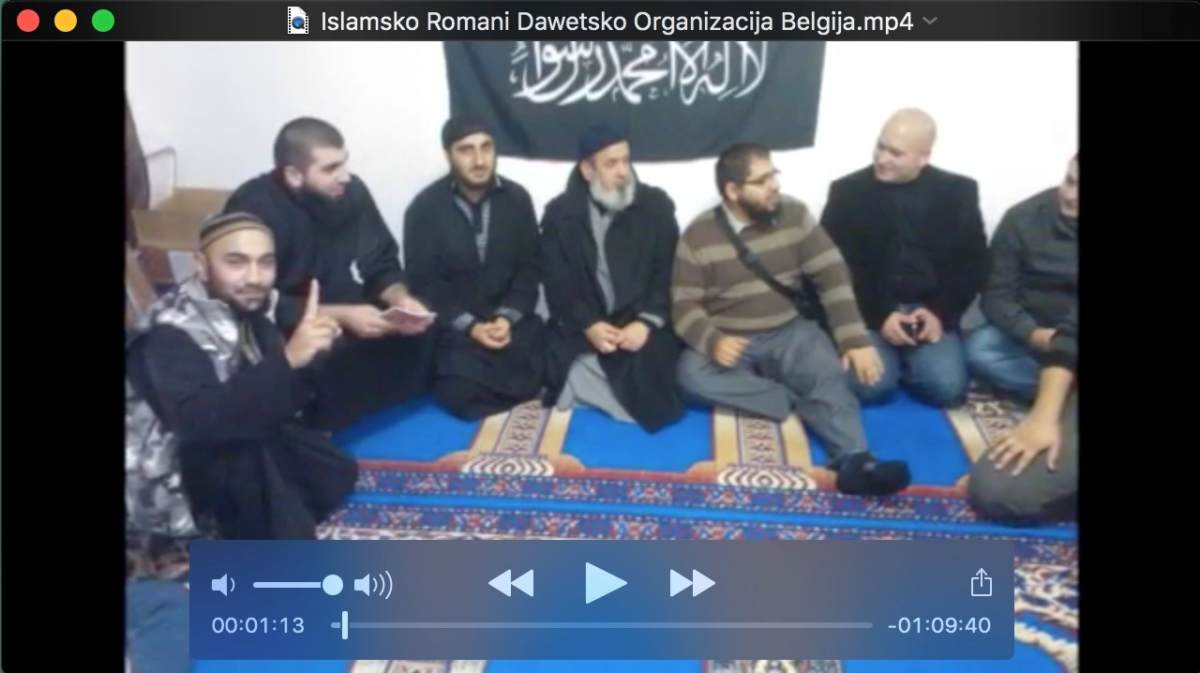‘Our Songs are Manifestos’: Why Music Matters for Belgium’s Far-Right
A skinhead carrying a guitar takes his place in front of the microphone in a Budapest park. A few hundred metres away, a police cordon and steel fence buffers the crowd of about 600 people, mostly men dressed in black, from shouting protesters. Flanked by the flag of the Hammerskins — an international white supremacist gang — the man performs a cover of ‘The Snow Fell’, a song by a notorious British neo-Nazi band.
This is the so-called Day of Honour, a rally hosted by far-right extremists in the Hungarian capital. It honours the encircled Nazi forces responsible for killing more than half a million Jews in Hungary who tried to escape from an Allied siege of the besieged city in February 1945. Reported on by this author in February 2020, the annual rally was banned by Hungarian authorities in 2022.
The singer who performed at the 2020 rally is now planning to bring his act closer to home. Harm-Jan Smit is one of several far-right musicians on the bill at Frontnacht, a concert planned for the end of August 2022, as part of an annual nationalist festival in the Dutch-speaking Flanders region of Belgium.
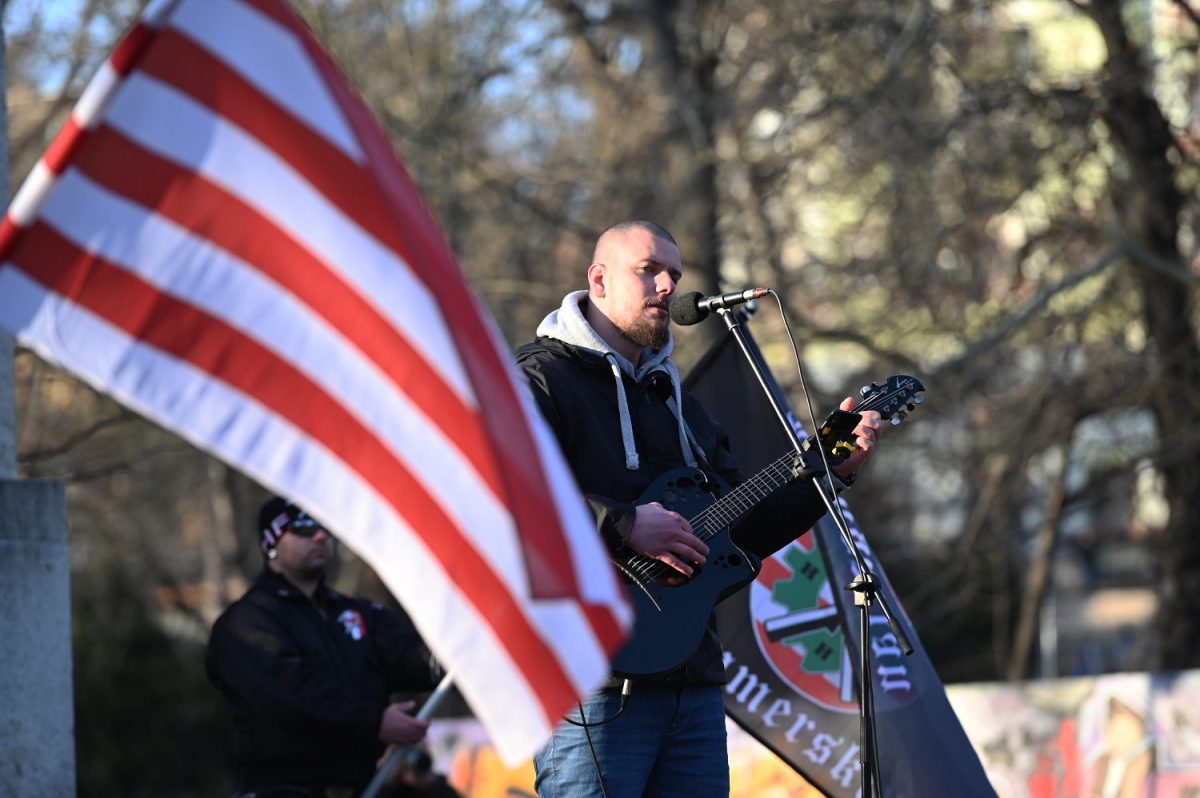
Harm-Jan Smit, a Dutch far-right musician, performs at the ‘Day of Honour’ in Budapest, Hungary on February 8, 2020. (Image from Recherche-Nord, CC BY-NC 4.0)
Authorities in Ieper, where Frontnacht will take place, have said that there are no legal grounds to ban the concert – likely in reference to Belgium’s Anti-Racism Law which prohibits hate speech.
“Of course, we won’t tolerate neo-Nazism or fascism in Ieper, so we’ll watch closely to ensure that nothing goes wrong”, City Alderman Diego Desmadryl told Antwerp-based Het Laatste Nieuws. “However, that’s not to say that if groups or musicians may have had links with such groups, they still have them today”, he continued. Desmadryl also noted that the city authorities had sought advice from the police and OCAD, a Belgian state counter-extremism agency, on the issue.
Frontnacht’s organisers claim there’s nothing “far-right extremist” or “neo-Nazi” about the festival, and have said online that critics have pulled their arguments “out of thin air”. On 23 July, Frontnacht started running an ad for their “identitarian music” event on Facebook.
But open source evidence shows that these criticisms are well grounded. Frontnacht’s headliners are well-known performers in the international far-right extremist music scene, with one band openly describing their repertoire as “manifestos” for their cause.
Even if their lyrics don’t fall foul of hate speech laws, experts warn that far-right extremist music can be a powerful recruitment and radicalisation tool.
The organisers of Frontnacht did not respond to multiple requests for comment from Bellingcat’s reporter.
“We want to present our message in a more contemporary way”
This year, Frontnacht will be held as part of the Flemish nationalist festival Ijzerwake.
Ijzerwake, named after the Ijzer or Yser river which flows through France and Belgium, broke away from the more mainstream Ijzerbedevaart, “Ijzer pilgrimage”, in 2003.
Ijzerbedevaart was first held in 1920, commemorating Flemish soldiers serving in the Belgian army who perished in the First World War. The pilgrimage has become a focal point of a growing yet diverse Flemish nationalist movement. Its adherents across the political spectrum have sought more autonomy for Flanders, union with the Netherlands, and an independent Flemish state.
In the Second World War, however, some elements of the Flemish nationalist movement collaborated with Nazi Germany. “Flemish nationalism was tarnished by World War II and collaboration,” said the historian Tom Junes, a scholar of nationalism and historical memory across Europe. “Nevertheless it was a broad movement as such and it had a ‘left-wing’ or rather progressive, emancipatory tendency as well”, Junes told Bellingcat.
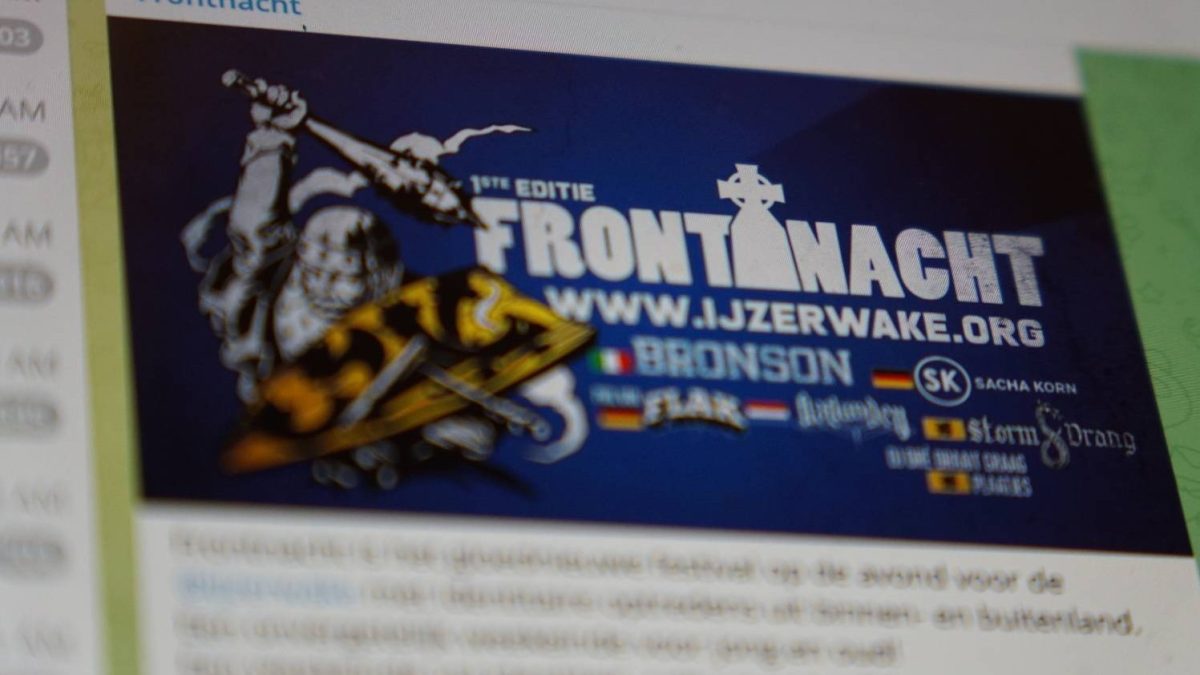
Photograph of Frontnacht’s first Telegram post, May 5, 2022, advertising the concert. Photo (c): Michael Colborne.
By the 1980s Ijzerbedevaart had become more associated with neo-Nazis who took part in the event. Organisers tried to distance themselves from these more radical elements in an effort to broaden the event’s appeal. This led to physical clashes between different factions, and in 2003 those more radical elements left to form their own separate event, Ijzerwake. “Not all Ijzerwake sympathisers are extreme right,” Junes stressed, “but generally [they] find the Ijzerbedevaart too moderate.”
Almost two decades later, Ijzerwake apparently sees a need to energise a new generation. “Today in Flanders and the Netherlands there are many people who call themselves identitarians, patriots, right-wing, but who haven’t (yet) found their way to a more traditional event like the Ijzerwake,” Rob Verreycken, one of Ijzerwake’s founders, said in May 2022.
“We want to package our patriotic message in a contemporary way for a new generation,” the co-founder continued, “and do that through identitarian music.”
Fascists, Hammerskins and “AJAB”
The phrase “identitarian music” obscures more than it reveals — the headliners at Ijzerwake’s Frontnacht are household names in the European far-right movement, popular with extremists from Ukraine to the United Kingdom.
Bronson, a band from Italy, was formed by members of the neo-fascist CasaPound Italia, a self-described movement of “Fascists of the Third Millennium.” Members and affiliates of CasaPound Italia have been accused and in some cases prosecuted for committing and encouraging violence against migrants, minorities and political opponents. Bronson’s admiration for Benito Mussolini and the Fascist era in Italy is evident in their music, videos and social media posts.
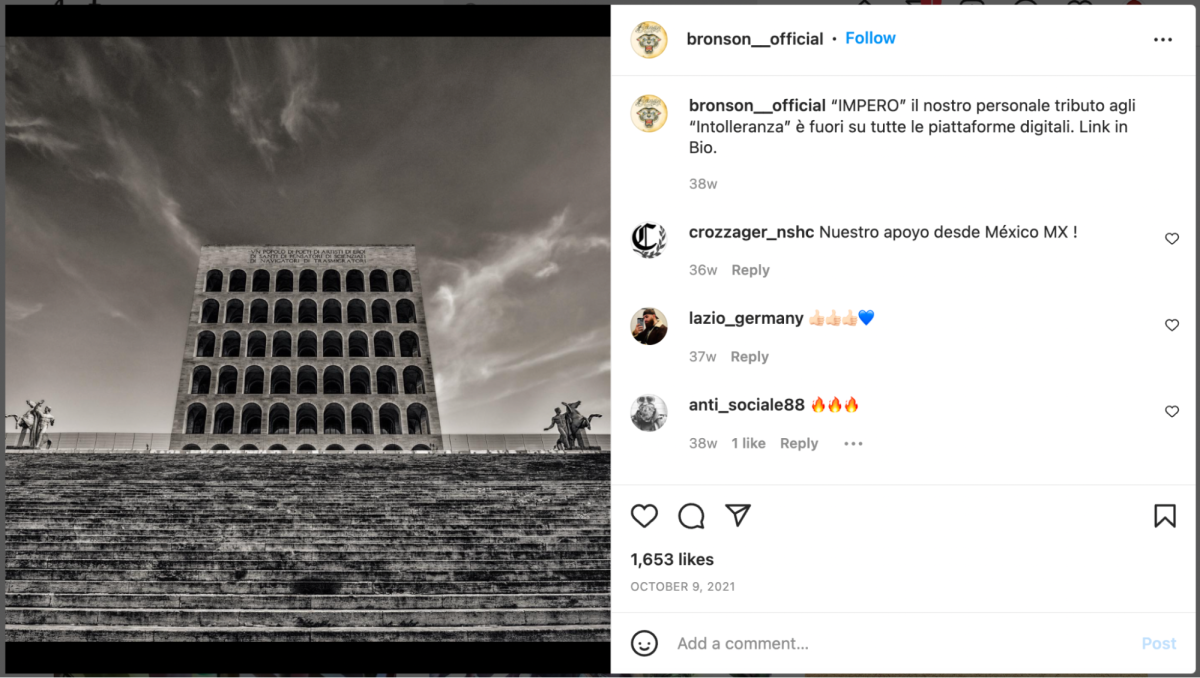
A screenshot from Bronson’s Instagram account showing the Palazzo della Civiltà Italiana, a building in Rome infamous for its association with fascist leader Benito Mussolini and adorned with quotes from the dictator
In an April 2021 interview with German political party Der Dritte Weg (The Third Way) —— Bronson made clear that their music was inseparable from their far-right politics. “Bronson as a project has always been a life and political choice… Our songs are manifestos of our lives”, reads a quote from Bronson on the party’s website. Der Dritte Weg is described by Germany’s Federal Office for the Protection of the Constitution as “right-wing extremist to neo-Nazi” in its orientation.
Another musician scheduled to play at Frontnacht, Philipp Neumann, appears to be a veteran of the European neo-Nazi music scene who has performed across eastern and western Europe. Neumann’s back catalogue of songs, both solo and with his band Flak, include songs with titles such as “ZOG”, which stands for ‘Zionist Occupied Government’ in reference to an antisemitic conspiracy theory. Others include “AJAB”, understood by the far right in Germany and beyond as a neo-Nazi code meaning ‘All Jews Are Bastards.’ In 2016, Swiss authorities banned Neumann, who is German, from entering the country to perform at a far-right event.
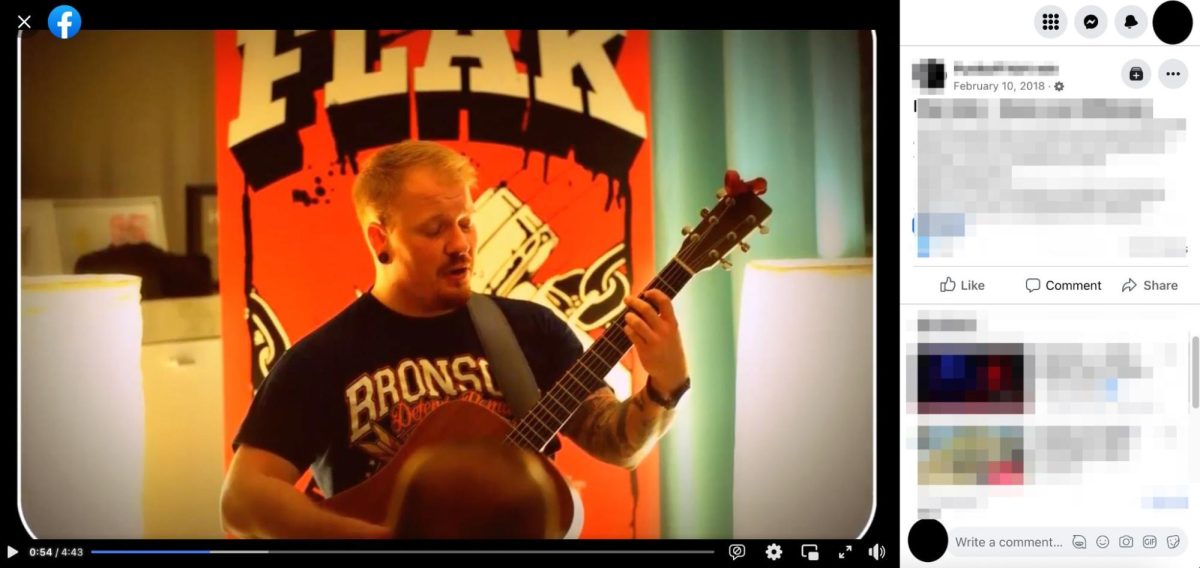
A screenshot of a February 2018 Facebook post (identifying details obscured by Bellingcat) showing a performance by Phillip Neumann, wearing a shirt from fellow Frontnacht performer Bronson
Neumann, according to researchers from the Exif-Recherche, a German research platform that monitors the European far right, has associated with Hammerskins members in the far-right music scene. An international white supremacist gang, the Hammerskins’ roots are in the United States but have a significant presence across Europe.
According to the Southern Poverty Law Center (SPLC), a US non-profit which monitors extremist groups, the racist skinhead who murdered six people at a Sikh temple in Wisconsin in 2012 was a member of the group. This June, a Lisbon court sentenced 22 Hammerskins members to jail on a range of crimes including attempted homicide.
The Hammerskins tend to be secretive about their activities, functioning almost like a biker gang with its chapters, hierarchies and different patches for prospects and full members.
The other German performer slated to appear at Frontnacht, Sacha Korn, reportedly has a more subtle relationship with the far right. Thorsten Hindrichs, an expert on European far-right music scenes from the Johannes Gutenberg University of Mainz told Bellingcat that “[Sacha] Korn is rather loosely networked in the German extreme right and works, situationally changing, with its most diverse actors,” expert on European far-right music. Sacha Korn, Hindrichs noted, has performed for Germany’s radical right party Alternative for Germany (AfD) and released an album with far-right media platform Einprozent (‘One Percent’).
“Sacha Korn quite skilfully knows how to remain vague and elusive, both in his song lyrics and in interviews and social media posts,” Hindrichs said.
Harm-Jan Smit, the Dutch far-right musician slated to perform at Frontnacht, is not as subtle in his views. According to the Rheiderland Zeitung, a local German newspaper, Smit now performs under a stage name and is the former guitarist of neo-Nazi band Blindfolded. A 2021 report from the Anne Frank Foundation, a Netherlands-based non-profit organisation that researches antisemitism and right-wing extremism, states that Blindfolded was affiliated with Crew38. The crew, which is designated as a hate group by the SPLC, is considered to be the “probationary network” of the Hammerskins. In addition to a few of his own compositions, Smit covers songs by Blood & Honour founder Ian Stuart Donaldson, Canadian white supremacist band RaHoWa — short for the neo-Nazi concept of “racial holy war” — and American neo-Nazi band Bound For Glory.

Lyrics from the song ‘Ode to a Dying people’ by Canadian white supremacist band RaHoWa, performed by Harm-Jan Smit on his 2020 release
“Music affects our mood, and it brings certain feelings to the surface,” Smit told a Hungarian far-right website in 2020. “This is exactly what makes it such a good tool in our hands.”
Normalising the far right?
“There are no legal reasons to ban this event,” an official from the city of Ieper said of the Frontnacht festival in July 2022. “The organisers have assured us that they will ensure no inadmissible things are displayed and no unacceptable lyrics are sung.”
Although that may not fall foul of Belgium’s Anti-Racism Law, this position fails to counter the threat posed by such far-right gatherings, according to Hindrichs.
“I think it is naive to believe that European neo-Nazi bands would be less dangerous just because they promise to eat chalk for once,” he said, referencing a German fairy tale where a wolf eats chalk to soften his voice to trick a group of children home alone to open the door.
“On the contrary,” Hindrichs added, “allowing Frontnacht to take place in this way more or less without further ado plays into the hands of the political strategy of normalising the extreme right.”
Want to stay up to date with Bellingcat Anti-Equality Monitoring investigations on the far right? Subscribe to our seasonal newsletter, where you’ll receive a selection of our stories, further reading suggestions, insights, information on Bellingcat training sessions and much more!
